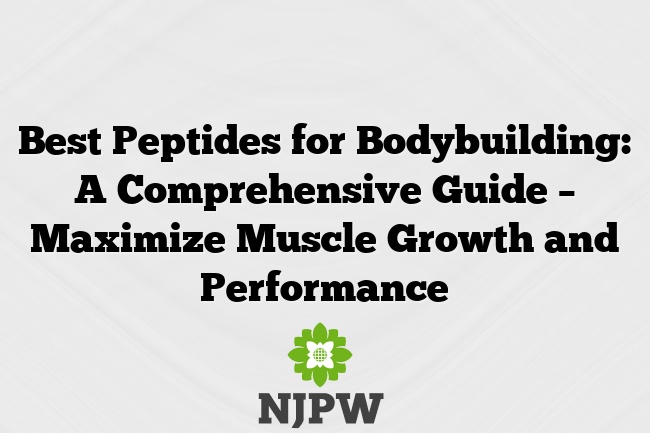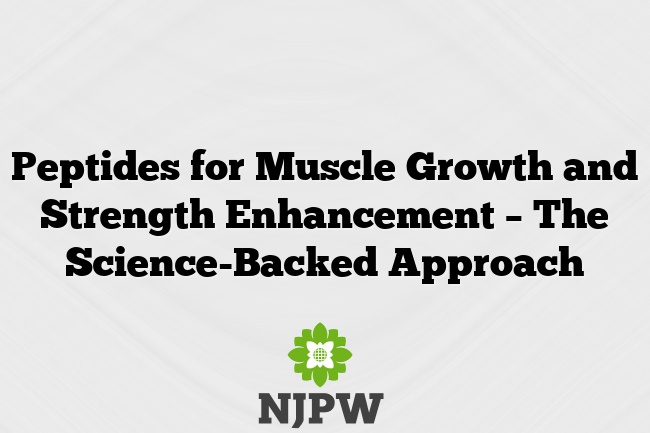Best Peptides for Bodybuilding: A Comprehensive Guide – Maximize Muscle Growth and Performance

Athletes and fitness enthusiasts alike have long sought effective ways to maximize their muscle growth and performance. Among the most promising tools in this pursuit are peptides – a class of compounds that have gained significant attention in the world of bodybuilding and sports nutrition.
Peptides are short chains of amino acids that play crucial roles in various physiological processes, including protein synthesis, hormone regulation, and cellular signaling. When used strategically, certain peptides can unlock remarkable benefits for those looking to build lean muscle mass, enhance recovery, and push the boundaries of their physical capabilities.
What are Peptides?
Peptides are essentially smaller versions of proteins, consisting of short chains of amino acids linked together. While proteins are large, complex molecules, peptides are more compact and often have more specific and targeted functions within the body. Peptides can be derived from natural sources, such as plants or animal tissues, or they can be synthetically produced in a laboratory setting.
In the context of bodybuilding and sports performance, peptides have gained attention for their ability to influence various physiological processes that are crucial for muscle growth, recovery, and overall athletic performance. Peptides can interact with specific receptors in the body, triggering cascades of cellular events that lead to increased protein synthesis, enhanced fat burning, and improved hormone regulation.
| Peptide | Primary Function | Potential Benefits |
|---|---|---|
| IGF-1 | Stimulates muscle growth and repair | Increased lean muscle mass, improved recovery |
| CJC-1295 | Enhances growth hormone production | Increased muscle mass, fat loss, improved performance |
| Ipamorelin | Promotes growth hormone release | Muscle growth, fat loss, anti-aging effects |
The Role of Peptides in Bodybuilding
In the realm of bodybuilding and sports performance, peptides have become increasingly popular due to their ability to target specific physiological mechanisms that are crucial for muscle growth, recovery, and overall athletic performance. By interacting with various receptors and signaling pathways, certain peptides can stimulate the production of growth hormones, enhance protein synthesis, and promote the utilization of fat for energy, all of which are essential for building and maintaining a lean, muscular physique.
One of the primary ways peptides contribute to bodybuilding success is by their ability to increase muscle mass. Peptides like IGF-1 and CJC-1295 have been shown to directly stimulate the growth and repair of muscle tissue, leading to significant gains in lean body mass. Additionally, peptides that influence the release of growth hormones, such as Ipamorelin, can indirectly support muscle growth by enhancing the body’s natural anabolic processes.
Beyond muscle growth, peptides can also play a role in improving athletic performance and recovery. Certain peptides have been found to enhance endurance, power output, and recovery time between intense training sessions, allowing athletes to push the limits of their physical capabilities.
Top Peptides for Muscle Growth and Performance
When it comes to the best peptides for bodybuilding and sports performance, a few stand out as particularly effective:
IGF-1 (Insulin-like Growth Factor-1) is a highly potent peptide that plays a crucial role in muscle growth and repair. By stimulating the protein synthesis pathway and promoting the proliferation of muscle cells, IGF-1 can lead to significant increases in lean muscle mass and improved recovery from intense training.
CJC-1295 is another popular peptide among bodybuilders and athletes due to its ability to enhance the release of growth hormones. This peptide works by stimulating the pituitary gland, leading to elevated levels of growth hormone in the body, which can translate to increased muscle mass, fat loss, and improved performance.
Ipamorelin is a peptide that specifically targets the release of growth hormone, making it a valuable tool for those seeking to build muscle and improve body composition. Unlike some other growth hormone-releasing peptides, Ipamorelin is known for its ability to do so without causing a significant spike in cortisol levels, which can be beneficial for maintaining a healthy hormonal balance.
Understanding the Science Behind Peptide Efficacy
The scientific mechanisms behind the effectiveness of peptides in bodybuilding and sports performance are rooted in their ability to influence various physiological processes. At the cellular level, peptides can interact with specific receptors, triggering a cascade of events that ultimately lead to the desired outcomes, such as increased protein synthesis, enhanced fat burning, and improved hormone regulation.
For example, IGF-1 binds to its receptors on muscle cells, activating the PI3K/Akt signaling pathway, which is a key regulator of protein synthesis and muscle growth. CJC-1295, on the other hand, works by stimulating the pituitary gland to release more growth hormone, which then triggers a series of downstream effects, including the production of IGF-1 and the mobilization of stored fat for energy.
Understanding these underlying mechanisms is crucial for effectively incorporating peptides into a comprehensive bodybuilding or sports performance regimen. By targeting specific physiological pathways, athletes and fitness enthusiasts can leverage the power of peptides to achieve their desired goals, whether that’s building muscle, improving recovery, or enhancing overall athletic performance.
Potential Benefits of Incorporating Peptides
The integration of peptides into a bodybuilding or sports performance regimen can unlock a wide range of potential benefits, including:
• Increased muscle mass and strength through enhanced protein synthesis and muscle cell growth
• Improved fat loss and body composition by promoting the utilization of stored fat for energy
• Enhanced recovery and regeneration of muscle tissue, allowing for more frequent and intense training
• Boosted endurance and power output through the regulation of hormones and energy metabolism
• Anti-aging benefits, such as improved skin health, joint function, and overall well-being
By carefully selecting and incorporating the right peptides into their regimen, athletes and bodybuilders can unlock a powerful synergy that helps them push the boundaries of their physical capabilities and achieve their desired physique and performance goals.
Selecting the Right Peptides for Your Goals
When it comes to incorporating peptides into a bodybuilding or sports performance regimen, the key is to select the right peptides that align with your specific goals and needs. This process requires a thorough understanding of the various peptides available, their mechanisms of action, and how they can be strategically combined to achieve the desired outcomes.
For those primarily focused on building muscle mass and strength, IGF-1 and CJC-1295 are two of the most promising peptides to consider. These peptides work by stimulating the production of growth hormones and promoting protein synthesis, leading to significant gains in lean muscle tissue.
Individuals seeking to improve fat loss and body composition may find Ipamorelin and peptides that enhance lipolysis (fat burning) to be particularly beneficial. These peptides can help mobilize stored fat for energy, allowing for a more efficient and sustainable path to a lean, muscular physique.
For athletes focused on enhancing endurance and power output, peptides that regulate energy metabolism and improve recovery can be invaluable. Combinations of peptides like IGF-1 and Ipamorelin may prove effective in this regard.
Ultimately, the selection of the right peptides will depend on your specific goals, current fitness level, and overall health status. Consulting with a knowledgeable healthcare professional or experienced bodybuilding/sports nutrition expert can help you navigate the complex world of peptides and develop a tailored plan that maximizes your chances of success.
Proper Dosing and Administration Protocols
When it comes to incorporating peptides into a bodybuilding or sports performance regimen, proper dosing and administration protocols are crucial for ensuring safety, effectiveness, and optimal results.
Dosing for peptides can vary depending on the specific compound, the individual’s body weight, and their desired outcomes. As a general guideline, peptide doses typically range from 100-500 micrograms (mcg) per day, with the specific dosage determined by factors such as the peptide being used, the individual’s response, and the desired effects.
Administration of peptides is typically done through subcutaneous injection, which involves injecting the peptide solution just under the skin, often in the abdomen or thigh area. This method of administration allows for efficient absorption and utilization of the peptide by the body.
It’s important to note that proper dosing and administration protocols should be followed strictly to ensure safety and maximize the effectiveness of the peptides. Consulting with a healthcare professional or experienced bodybuilding/sports nutrition expert can help you develop a personalized plan that takes into account your specific needs and goals.
Stacking Peptides for Synergistic Effects
In the world of peptides for bodybuilding and sports performance, the concept of “stacking” can be a powerful strategy for achieving even greater results. Peptide stacking involves the strategic combination of two or more peptides to leverage their synergistic effects and unlock a more comprehensive set of benefits.
When peptides are stacked, the individual compounds can work together to amplify their respective mechanisms of action, leading to enhanced muscle growth, improved recovery, and more efficient fat loss. For example, a stack consisting of IGF-1 and CJC-1295 can simultaneously stimulate protein synthesis and boost growth hormone production, resulting in a more potent anabolic effect.
Another effective peptide stack might include Ipamorelin and a peptide like GLP-1 (Glucagon-like Peptide-1), which can work together to promote fat loss while preserving lean muscle mass. This type of stack can be particularly beneficial for those looking to achieve a lean, defined physique.
When stacking peptides, it’s crucial to carefully consider the individual characteristics and mechanisms of each peptide, as well as how they may interact with one another. Consulting with a healthcare professional or experienced bodybuilding/sports nutrition expert can help you develop a personalized peptide stack that aligns with your specific goals and minimizes the risk of adverse effects.
Addressing Safety Concerns and Side Effects
While peptides can be a powerful tool for bodybuilding and sports performance, it’s essential to address the potential safety concerns and possible side effects associated with their use.
One of the primary concerns with peptides is the risk of adverse reactions, such as injection site irritation, headaches, or hormonal imbalances. To mitigate these risks, it’s crucial to follow proper dosing and administration protocols, as well as to work closely with a healthcare professional who can monitor your progress and adjust the regimen as needed.
Additionally, some peptides may interact with certain medications or underlying medical conditions, so it’s important to disclose your full medical history and any current medications to your healthcare provider before incorporating peptides into your regimen.
It’s also worth noting that the long-term effects of peptide use are not yet fully understood, and there may be potential risks that are not yet known. As such, it’s crucial to approach peptide use with caution and to prioritize your overall health and well-being.
To ensure the safe and responsible use of peptides, it’s recommended to work with a qualified healthcare professional who can provide personalized guidance and closely monitor your progress. This approach can help you maximize the potential benefits of peptides while minimizing the risks and ensuring your long-term health and safety.
Integrating Peptides into a Comprehensive Fitness Regimen
When it comes to incorporating peptides into a comprehensive fitness regimen, it’s important to view them as just one piece of the puzzle. While peptides can be a powerful tool for building muscle, improving recovery, and enhancing athletic performance, they should not be seen as a standalone solution.
To achieve the best results, peptides should be integrated into a well-rounded fitness plan that includes a balanced diet, structured training program, and adequate rest and recovery. This holistic approach ensures that the body is receiving the necessary nutrients, stimulation, and recovery time to optimize the effects of the peptides and drive sustainable progress.
For example, while IGF-1 and CJC-1295 may help boost muscle growth, a comprehensive strength training program and a diet rich in protein, carbohydrates, and healthy fats will be essential for maximizing those gains. Similarly, peptides that enhance fat burning and endurance should be paired with a balanced nutrition plan and a well-designed cardiovascular training regimen.
By integrating peptides into a holistic fitness approach, athletes and bodybuilders can unlock the true potential of these powerful compounds and achieve their desired goals in a safe, sustainable, and effective manner. Consulting with a healthcare professional or experienced fitness expert can help you develop a personalized plan that seamlessly incorporates peptides into your overall fitness strategy.
Conclusion
The world of peptides has opened up new frontiers for bodybuilders and athletes seeking to maximize their muscle growth, performance, and recovery. By leveraging the targeted mechanisms of these powerful compounds, individuals can unlock a range of benefits, from increased lean muscle mass to enhanced fat burning and endurance.
However, the successful incorporation of peptides into a fitness regimen requires a deep understanding of the various peptides available, their specific mechanisms of action, and how they can be strategically combined to achieve desired outcomes. Additionally, it’s crucial to address safety concerns, follow proper dosing and administration protocols, and integrate peptides into a comprehensive fitness plan that includes a balanced diet, structured training, and adequate rest and recovery.
By approaching the use of peptides with a well-informed and holistic mindset, bodybuilders and athletes can unlock their true potential and push the boundaries of their physical capabilities.
Frequently Asked Questions
What are the most effective peptides for building muscle?
The most effective peptides for building muscle are those that stimulate protein synthesis and enhance the production of growth hormones, such as IG






